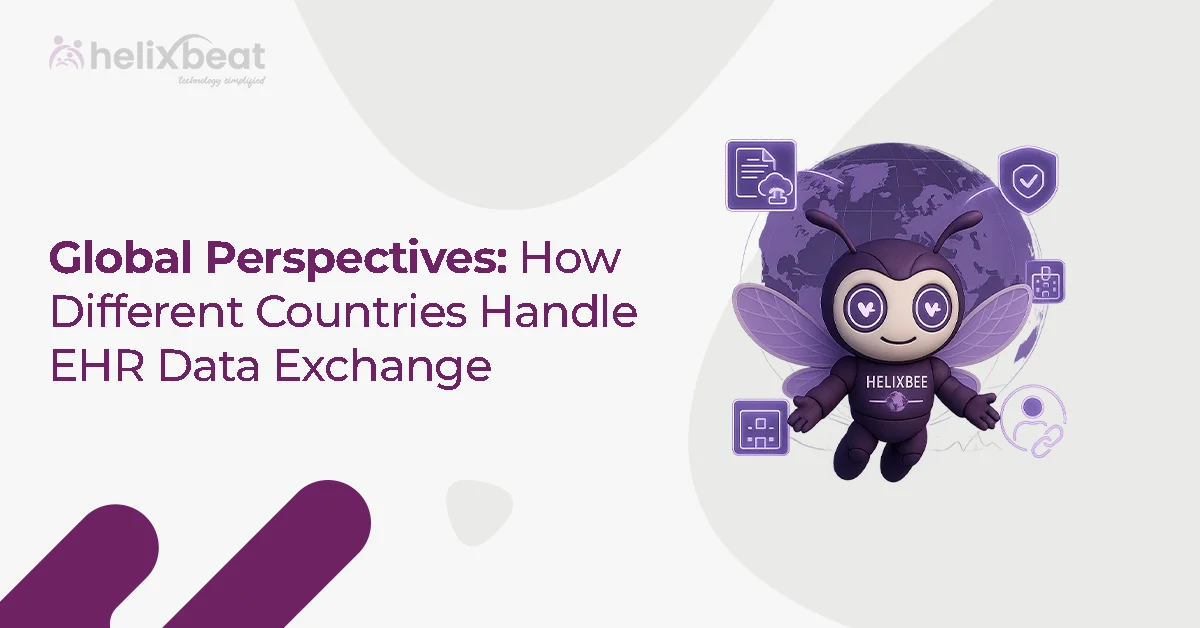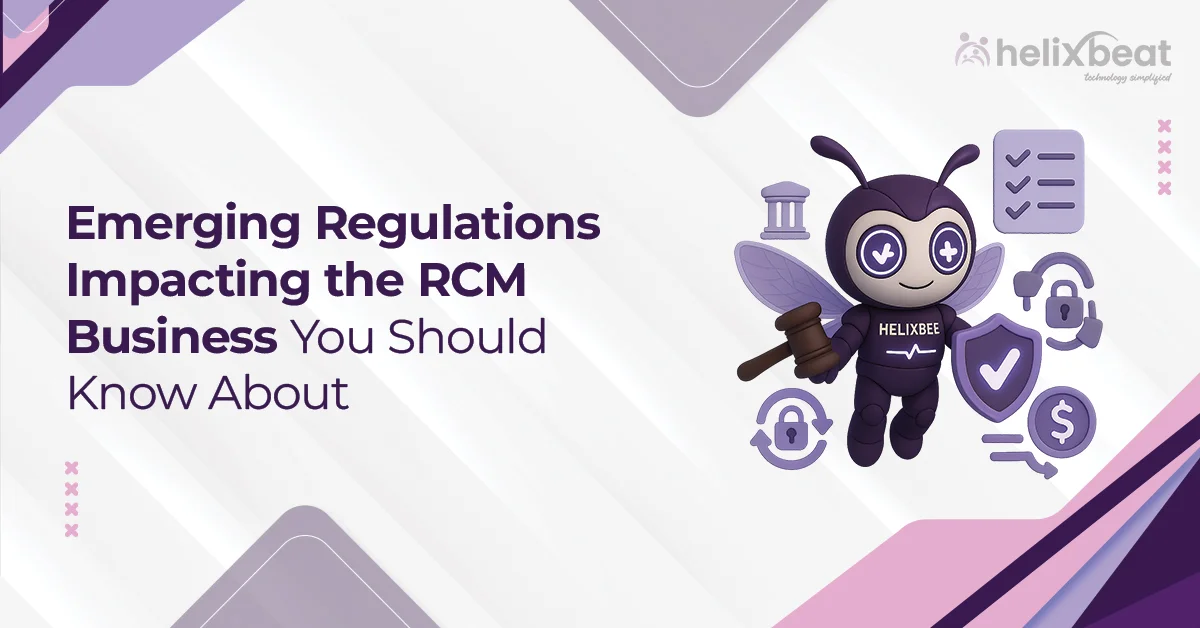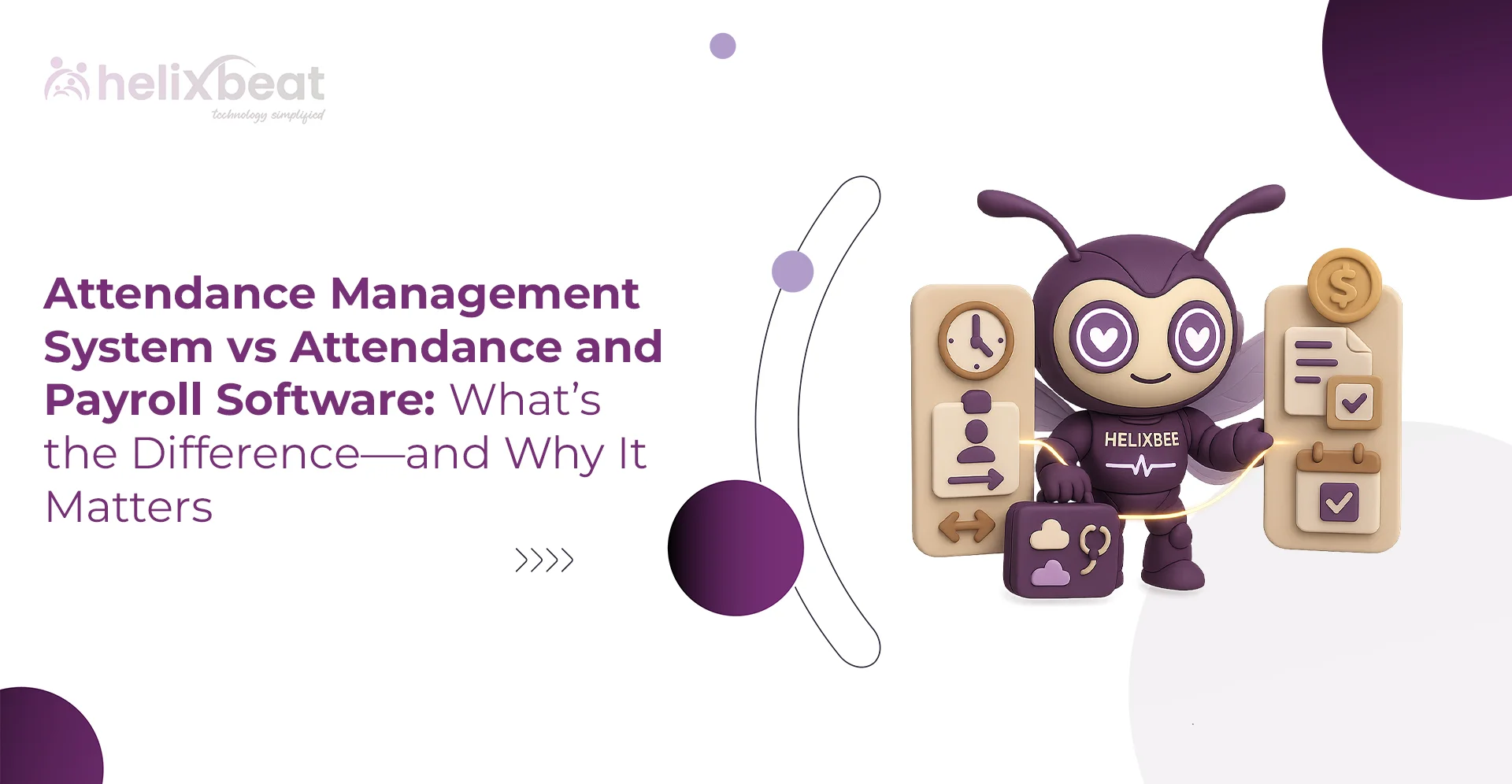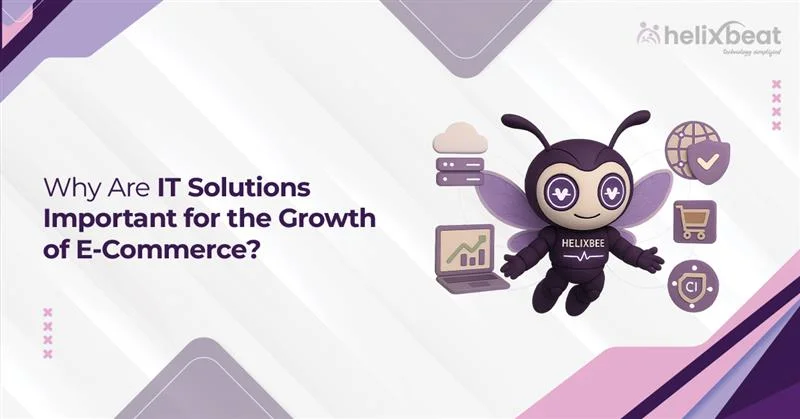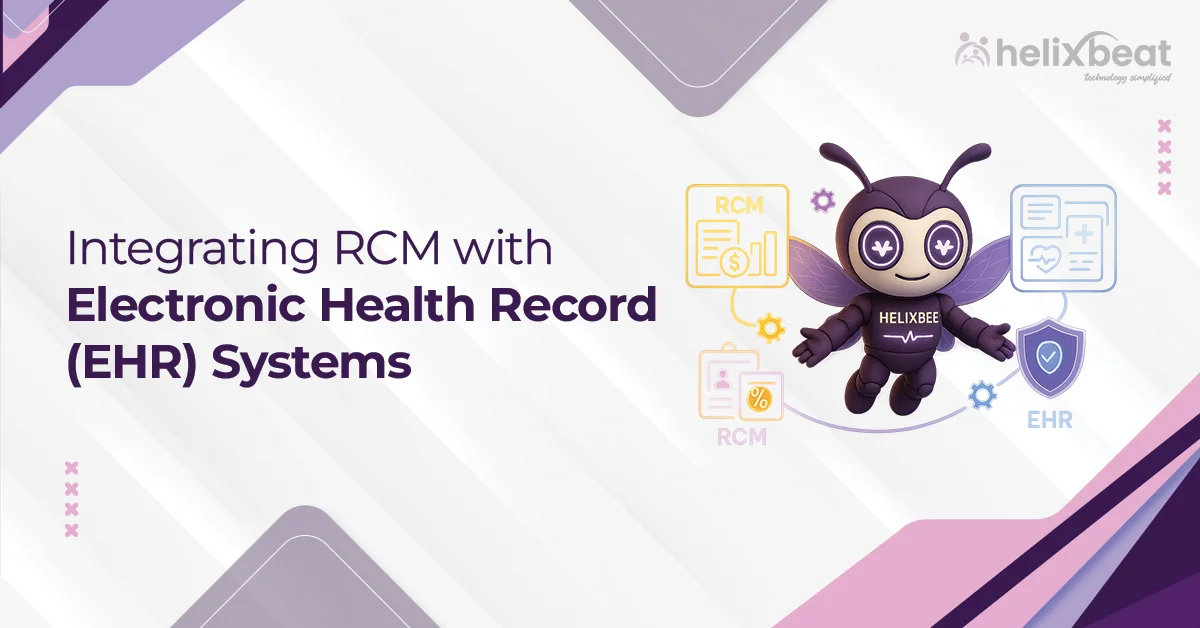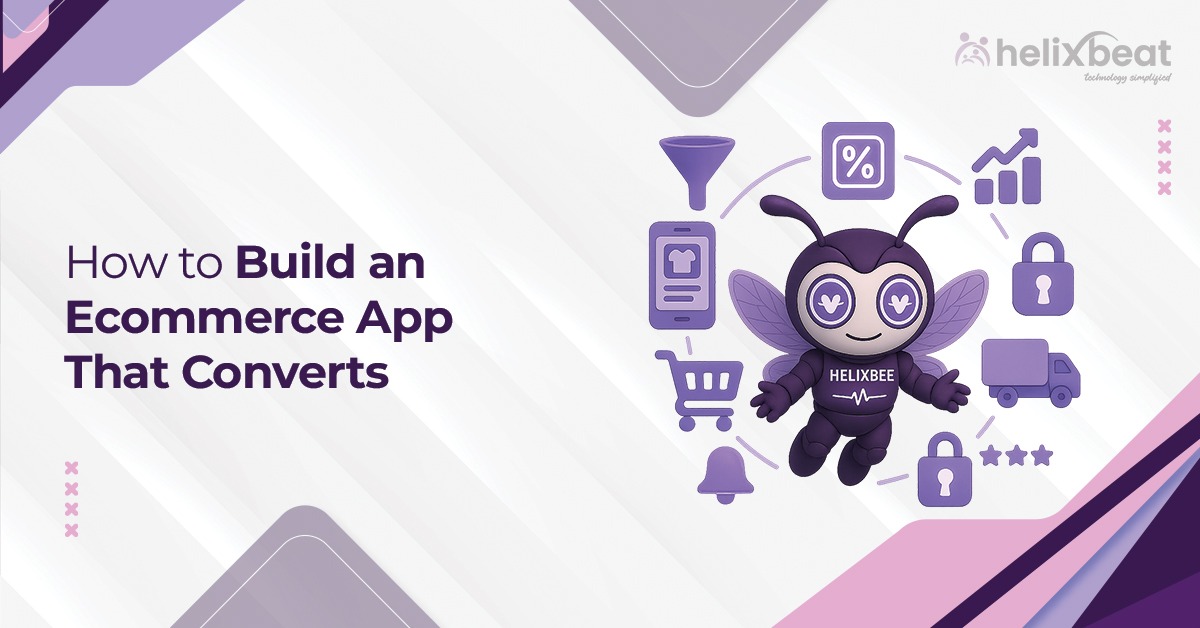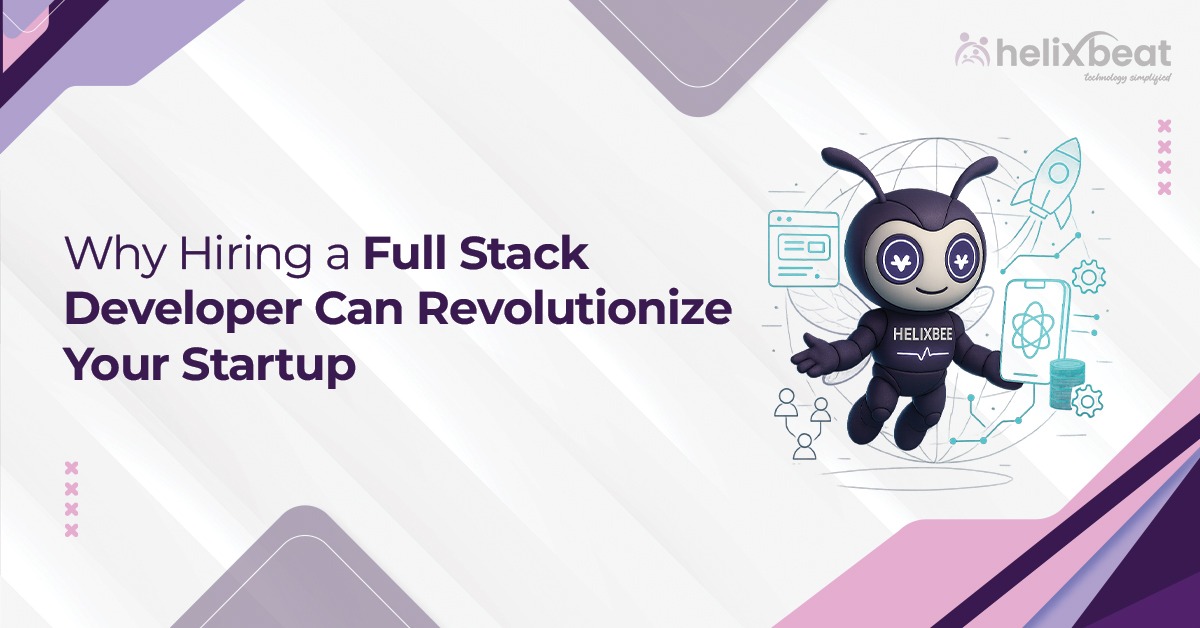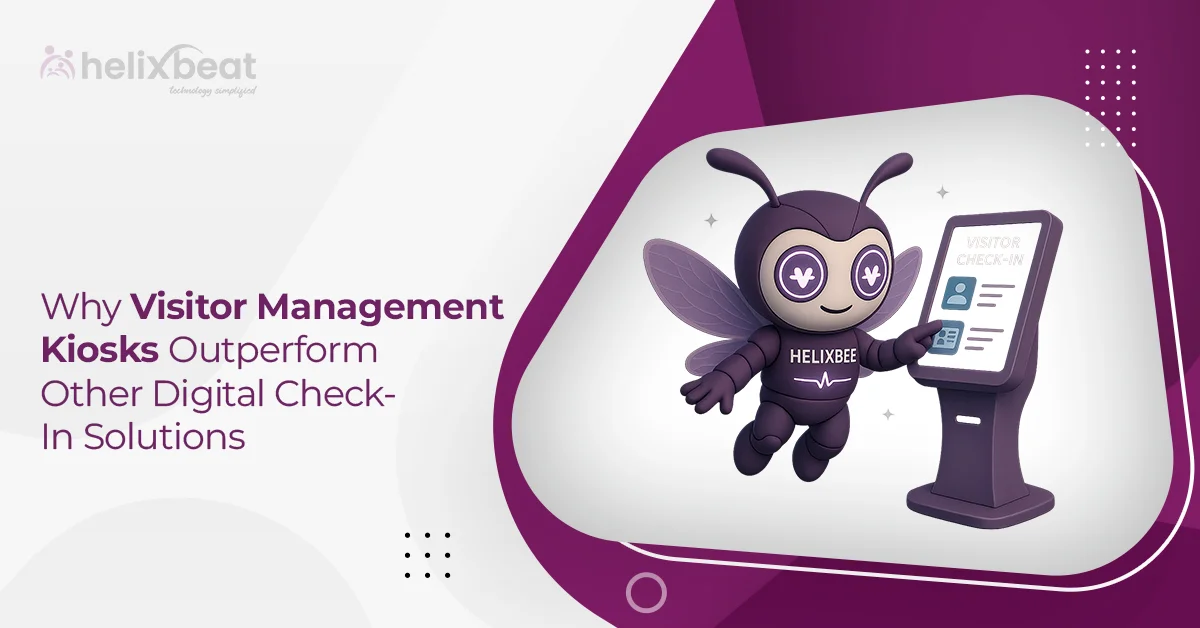What if you could see every product movement, verify authenticity at every step, and eliminate fraud from your supply chain entirely? That’s the future that blockchain application technology is bringing to supply chain management. With the rise of decentralised applications, real-time data transparency and tamper-proof records are becoming not just possibilities, but expectations.
For organisations looking to lead rather than follow, embracing blockchain in logistics is no longer optional. Companies like Helixbeat are reshaping how businesses manage procurement, track shipments, and prove compliance. Let’s explore how blockchain transforms traditional supply chains and why now is the time to act.
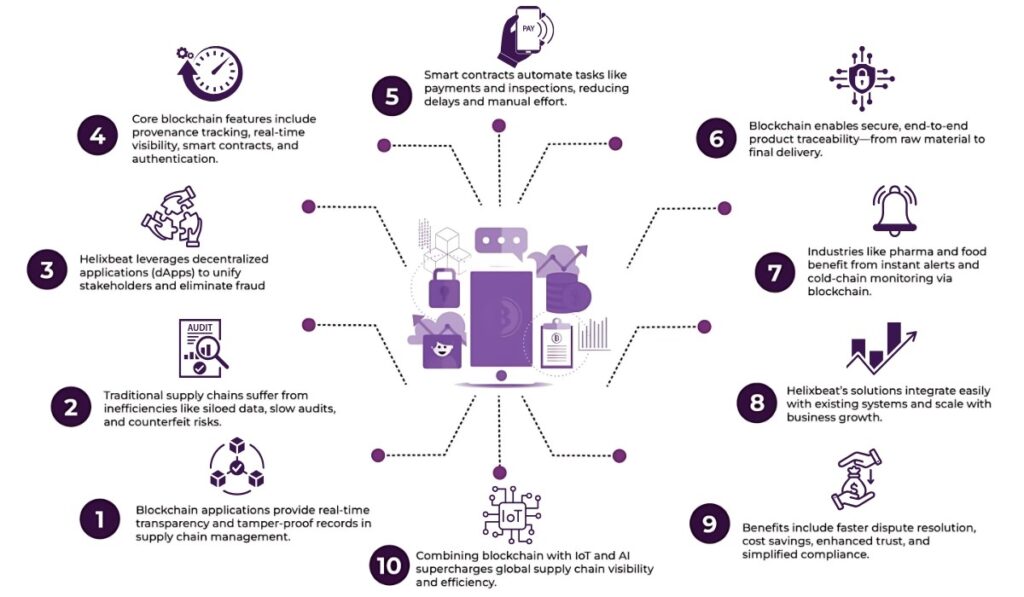
Table of Contents
Why Traditional Supply Chains Need Change?
Legacy systems in supply chains often rely on siloed databases, paper records, and trust-based relationships—all of which leave room for inefficiencies and errors.
Where Do Traditional Models Fall Short?
- Lack of real-time tracking
- Complex vendor verification
- Paper-heavy audits
- Risk of counterfeit or tampered goods
- Delays in dispute resolution
Blockchain application technology can close these gaps. By offering a shared ledger accessible to all parties, every update becomes transparent and verifiable.
Example
In food safety, tracing a product’s journey from farm to shelf can take days. With a blockchain application in place, it takes seconds. This instant traceability is saving time, improving compliance, and even saving lives.
Blockchain in logistics, combined with decentralised applications, ensures data integrity and operational efficiency, addressing the key flaws of traditional systems.
How Does a Blockchain Application Work in Logistics?
At its core, a blockchain application in logistics records transactions across an immutable and tamper-proof distributed ledger. This ensures transparency and security throughout the supply chain, providing real-time insights that were once difficult to achieve.
Key Functionalities of Blockchain in Logistics:
- Provenance Tracking: See a product’s complete journey, from manufacturer to end user, ensuring transparency at every step.
- Real-Time Visibility: Track status changes instantly, enabling faster decision-making and improved operational efficiency.
- Smart Contracts: Automate payments, quality checks, and handovers, reducing manual effort and eliminating delays.
- Authentication: Confirm identities and prevent counterfeits by verifying every step in the process.
Role of Decentralised Applications
Decentralized applications (dApps) allow multiple stakeholders to interact securely with the supply chain system. For instance, a manufacturer, customs authority, and logistics provider can all access the same record without intermediaries. This significantly reduces the risk of fraud and increases the overall efficiency of the supply chain.
Helixbeat builds decentralized applications that seamlessly integrate into your existing platforms—enabling faster, smarter decision-making at every step. With Blockchain in logistics, businesses gain a competitive edge by enhancing traceability, accountability, and collaboration across the supply chain.
Helixbeat’s Blockchain Solutions for Supply Chains
Helixbeat’s blockchain application capabilities are not just theoretical. They’re operational, field-tested, and tailored to your supply chain needs.
Why Businesses Choose Helixbeat?
- Custom blockchain solutions based on specific logistics use cases
- Tamper-proof data storage for compliance and audits
- Smart contract automation for transactions and delivery milestones
- Seamless integration with existing systems like ERPs or IoT devices
- Scalable architecture designed to grow with your operations
Supply Chain Transparency by Design
Helixbeat develops blockchain applications that make each product’s movement traceable, from raw material sourcing to end-user delivery. This kind of visibility reduces fraud, speeds up customs processing, and increases end-consumer trust.
Example Use Case
In pharma, blockchain in logistics can trace temperature-sensitive drugs across transit checkpoints. Smart contracts trigger alerts if the cold chain is broken, protecting quality and ensuring patient safety.
By leveraging decentralized applications, Helixbeat ensures secure and efficient management of your supply chain, improving transparency and reducing risks.
Benefits of Blockchain in Logistics
If you’re considering a blockchain application for your supply chain, these benefits are hard to overlook.
1. Data Integrity and Security
With blockchain, data cannot be altered once entered. Helixbeat uses cryptographic encryption and decentralized applications to safeguard records. This ensures that all transactions are secure, transparent, and immutable, giving businesses and customers confidence in the data integrity.
2. Faster Dispute Resolution
Disagreements between suppliers, shippers, or buyers can be resolved instantly with access to a single source of truth. Blockchain in logistics provides real-time, tamper-proof records that help clear up misunderstandings quickly. This immediate resolution improves overall supply chain efficiency and reduces delays caused by disputes.
3. Cost Reduction
Automated processes via smart contracts reduce manual work, paperwork, and compliance costs. By automating tasks such as payments and quality checks, businesses can cut costs, reduce the risk of human error, and improve efficiency. Helixbeat’s blockchain application services ensure that these processes are securely and efficiently executed.
4. Enhanced Customer Trust
Transparency at every supply chain step increases confidence—especially in industries like food, fashion, and pharma. With blockchain, customers can track products from raw material to end delivery, ensuring authenticity and safety. Helixbeat’s solutions make it easier for businesses to demonstrate this transparency, building trust with consumers.
5. Regulatory Compliance Made Simple
Blockchain application frameworks from Helixbeat help automate regulatory reporting with immutable, real-time records. These systems streamline the compliance process by creating tamper-proof documentation that meets industry standards and regulations, reducing the risk of non-compliance.
Challenges in Blockchain Adoption—And How Helixbeat Solves Them
Every innovation brings challenges, and blockchain is no exception. But the right partner can make all the difference.
Common Challenges
- Integration with legacy systems
- Lack of blockchain expertise
- Concerns about scalability
- Unclear ROI metrics
How Helixbeat Addresses These Issues?
- Offers plug-and-play integration tools
Helixbeat provides seamless solutions to integrate blockchain application technology with your existing infrastructure. This minimizes disruptions and accelerates adoption, ensuring smooth compatibility across platforms.
- Provides blockchain training and onboarding support
Recognizing that blockchain in logistics and decentralized applications are still evolving, Helixbeat offers comprehensive training and support. This ensures your team has the expertise needed to manage and optimize your blockchain solutions.
- Designs scalable decentralized applications
Helixbeat builds decentralized applications (dApps) that scale as your business grows. With a focus on future-proof architecture, these applications are designed to handle increasing data and transactions without compromising performance.
- Helps define and track custom ROI parameters
Understanding the ROI of blockchain applications can be difficult, but Helixbeat helps businesses set clear, measurable goals and track the impact of their blockchain investments. By aligning blockchain solutions with business objectives, Helixbeat ensures you can see the tangible benefits.
Helixbeat doesn’t just build blockchain applications—it builds strategies for long-term success. By addressing these common challenges, Helixbeat enables businesses to fully leverage the power of blockchain and reap the rewards of its transformative potential.
What Makes Blockchain Ideal for Global Supply Chains?
Global supply chains involve multiple geographies, regulations, currencies, and players. That’s why a decentralized, transparent system like blockchain is tailor-made for such complexity.
Key Blockchain Application Capabilities for Global Trade:
- Cross-border payment verification via smart contracts
- Digitized Bills of Lading
- Real-time compliance tracking
- Supplier scorecards powered by immutable data
Blockchain in logistics enables faster, more efficient processes by ensuring that every transaction is recorded on an immutable ledger, reducing fraud and increasing trust between partners. This is especially beneficial in global supply chains where transactions often span different legal and regulatory environments.
Blockchain is particularly powerful when combined with other technologies like IoT or AI. For example, Helixbeat can integrate sensors that feed shipment data directly into the blockchain, creating a live audit trail. This integration of decentralized applications (dApps) makes it easier to track goods in real-time, ensuring transparency and reducing the risk of errors or delays.
By combining blockchain applications with IoT and AI, Helixbeat helps businesses streamline their global supply chains, improving efficiency and ensuring that every step—from payment to delivery—is seamlessly tracked and verified.
Final Words
Supply chains are under increasing pressure to be faster, more transparent, and more resilient. Blockchain application technology is not just a tool; it’s a game-changer for logistics.
With Helixbeat, you can:
- Build decentralized applications tailored to your supply chain
- Secure data with tamper-proof records
- Improve trust across every stakeholder interaction
- Automate with smart contracts to reduce overhead
The future of supply chain management is decentralised, transparent, and digital. Start building it today with Helixbeat.
FAQs
1. What is a blockchain application in supply chain management?
A blockchain application records and shares supply chain data across a secure, tamper-proof, and decentralized ledger.
2. How does blockchain in logistics improve transparency?
By enabling all participants to access the same real-time data, reducing disputes and delays.
3. What is a decentralized application (dApp) in logistics?
A dApp is a blockchain-based application that multiple parties can use to interact with a shared logistics system.
4. How do smart contracts work in supply chains?
They automate tasks like payment processing, shipment validation, and quality checks when conditions are met.
5. Is blockchain in logistics suitable for small businesses?
Yes, blockchain application solutions can be scaled to fit businesses of any size, offering cost savings and transparency.






